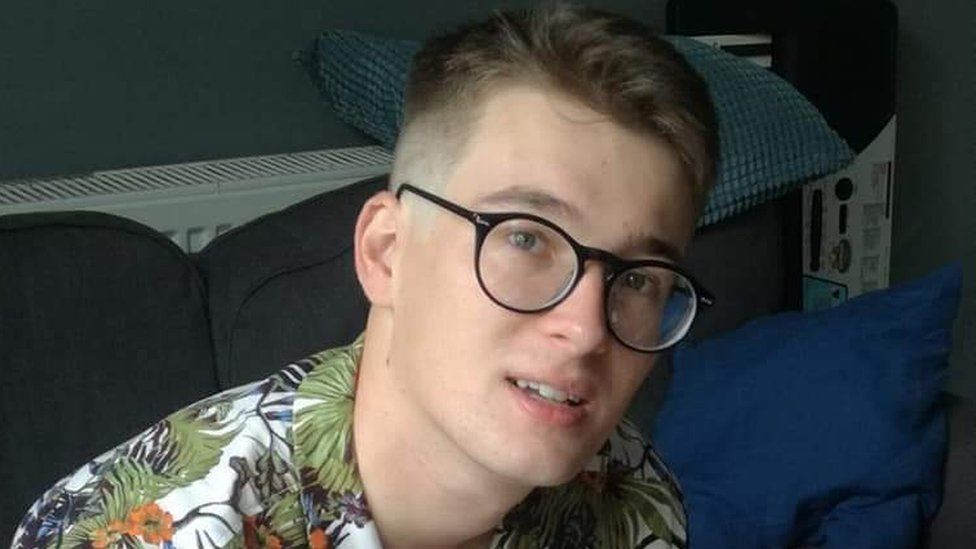ARTICLE AD BOX
 Image source, Esther Brennan
Image source, Esther Brennan
Student Theo Brennan-Hulme was 21 when he killed himself in the bedroom of his student accommodation
By Sophie Hutchinson
BBC News
Campaigners have written to the chief constables of Norfolk and Suffolk to request an investigation into thousands of mental health deaths in those areas.
They say coroners are raising safety issues but no improvements are being made.
A report by independent auditors found as many as 8,440 patients had died unexpectedly over three years.
Norfolk and Suffolk NHS Foundation Trust said it had started a review of patient deaths.
Coroners worried about the risk of future deaths highlight unsafe practices in what are known as prevention-of-future-deaths reports (PFDs). And authorities are required by law to respond with an action plan within 56 days.
The Norfolk and Suffolk trust said it had responded to all PFDs and was working to ensure recommendations and actions were implemented.
But Mark Harrison, from the Campaign to Save Mental Health Services in Norfolk and Suffolk, said: "There's a criminal case to answer. And we want the police to investigate, where the same mistakes have been repeated time and time again."
He said coroners were repeatedly warning of risks such as:
Mr Harrison said: "The mental health trust always responds saying they've learned lessons, they are changing policy and practices.
"But then what we're seeing in analysing the orders from the coroner are repeat circumstances where other people have died in similar circumstances to a previous prevention-of-future-deaths notice."
Image source, Esther Brennan
Image caption,Theo's family was not contacted after an emergency mental-health assessment
Student Theo Brennan-Hulme, 21, suffered from bouts of severe anxiety. And in early 2019, in the midst of a crisis, he had sought help from his GP, his mother, Esther Brennan, told BBC News.
Mr Brennan-Hulme was referred to the community mental-health service in Norfolk as an emergency but waited eight hours before being assessed at Hellesdon Hospital, Norwich.
His family was not contacted after the assessment, despite this being part of the treatment plan in place, or referred to the mental-health home-treatment team to enable treatment options to be explored.
His absence at a previously arranged wellbeing service appointment, on 6 March 2019 was not followed up.
And on 12 March, he was found in his university bedroom having killed himself.
'Died horrifically'
Miss Brennan said it had taken several years of pursuing the trust to discover mistakes in his care had happened before.
"The lack of training, lack of staffing, the lack of following policy, the lack of care was known about," she said.
"I know there were previous PFDs, before Theo, that suggested things needed to improve urgently.
"They couldn't have got any worse for Theo and that's abhorrent to the memory of all the people who went before him."
"He died horrifically, alone, with nobody, and everything that they didn't do exacerbated his state."
'Lost track'
Serious questions remain about the deaths of mental-health patients in Norfolk and Suffolk.
In June this year, independent auditors Grant Thornton concluded the trust had simply lost track of who had died.
Between 2019 and 2022, more than 8,000 patients had died unexpectedly and, for three-quarters, the trust still did not know how or why, their report found.
The trust defines an "unexpected death" as the death of a patient "who has not been identified as critically ill or whose death is not expected by the clinical team".
It said: "We offer our sincere condolences to all families and carers of people affected."
And it added it would do its very best to ensure deaths were "minimised in future".
'Very toxic'
But a nurse at the trust told BBC News senior management was still not listening.
Charlie, not his real name, said: "It's very toxic within the trust - there are undertones of bullying. And if you raise concerns about patient safety, or even staff safety, you're not listened to."
A "significant proportion" of the deaths he was aware of had been preventable, he said.
"Very simple measures could have been put into place to avoid these people dying," Charlie said, adding staff shortages were compounding the problem.
A youth team had lost eight members of staff in a month and one of the crisis teams was so short-staffed it no longer functioned at night.
Two months ago, trust deputy chief executive Cath Byford told the Norfolk Health Overview and Scrutiny Committee it would take another four years "at least" for the "measurable culture" to improve.
The trust told BBC News it had begun a review of PDFs, "to ensure improvements in practice have been made and learning is embedded across clinical services".
Campaigner Mark Harrison said changes to mental-health services could not come quickly enough
For Mr Harrison, changes cannot come quickly enough.
"We've got lots of members of the campaign who are bereaved parents, or parents of children who can't get services, so their biggest fear is that their children will end up in the same way as the bereaved parents," he said.
"So it's toxic. And we've been doing this for 10 years."
The campaign has also written to NHS England, the Department of Health and Social Care, the Care Quality Commission and local MPs.
Related Internet Links
The BBC is not responsible for the content of external sites.

 1 year ago
23
1 year ago
23








 English (US) ·
English (US) ·